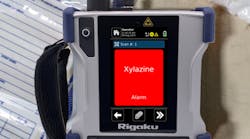PORTLAND, Oregon -- Oregon Gov. Tina Kotek on Monday signed a package of bills that makes minor drug possession a crime again and infuses millions into behavioral health programs, officially marking the end of the state’s short-lived and politically tumultuous experience with drug decriminalization.
Kotek signed House Bill 4002 as expected but not before meeting with a wide-range of groups, including prosecutors, defense lawyers, the state’s chief justice and the Department of Corrections, in an effort to outline her expectations for what comes next.
“Success of this policy framework hinges on the ability of implementing partners to commit to deep coordination at all levels,” Kotek wrote in a letter Monday to Senate President Rob Wagner and House Speaker Julie Fahey.
Senate Bill 5204, the other bill signed by the governor, sets aside $211 million for programs and projects intended to expand access to substance abuse treatment, including in jails, and mental health services across Oregon. It also includes funding for substance abuse prevention education.
Both bills passed the Legislature with bipartisan support and were among the top policy priorities of the short session that ended last month.
HB 4002 makes possession of small amounts of hard drugs a misdemeanor crime again and creates a new class of misdemeanor that comes with the potential of up to 180 days in jail. Lawmakers emphasized during debates over the bill that people found with street drugs should have multiple opportunities to enter treatment before they get sent to jail.
The change goes into effect Sept. 1.
The new law allows local law enforcement to decide whether to opt into giving people the chance to pursue substance-abuse treatment before they are booked into jail.
As of this week, the Legislature’s website shows 23 counties, including those in the Portland metro area, have so far signed onto the approach.
How each program will look is still under discussion; a symposium for local governments and law enforcement will be held next month to examine ways to carry out the law.
Kotek said she expects the Department of Corrections to “exhaust non-jail opportunities for misdemeanor sanctions” and ensure a “consistent approach for supervision when an individual is released” from custody to enter treatment.
She said corrections leaders understand that the new system “cannot be business as usual.”
The governor said committing to pre-arrest “deflection” programs will help “reduce collateral consequences of justice system involvement and can help mitigate the racial and ethnic disparities this legislation is projected to create.”
She added that implementing the law will be complex “but committing to clarity and coordination is one way to improve its likelihood of long-term success.”
She directed the Criminal Justice Commission, the state agency that tracks and analyzes criminal justice trends, to “encourage and prioritize the deep collaboration I believe is necessary for this framework to work.”
The new law is expected to increase the number of unrepresented people in the criminal justice system. As of this week, nearly 3,000 people who have been charged with crimes lack legal representation, according to the Oregon Judicial Department.
Kotek acknowledged the implications of the law on the ongoing public defense crisis, saying she would “continue to be an engaged partner as we identify resources and strategies to make progress on this shared concern.”
The new law guts a central element of Measure 110, the voter-approved approach passed in 2020 that made minor possession of street drugs like fentanyl, methamphetamine and heroin a non-criminal violation on par with a traffic ticket.
The measure also made hundreds of millions of dollars from cannabis taxes available for a range of services, including treatment, intended to address addiction. Those expenditures are expected to continue.
— Noelle Crombie is an enterprise reporter with a focus on criminal justice. Reach her at 503-276-7184; ncrombie@oregonian.
Our journalism needs your support. Subscribe today to OregonLive.com.
©2024 Advance Local Media LLC. Visit oregonlive.com. Distributed by Tribune Content Agency, LLC.



